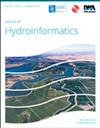城市供水系统对极端水文气候响应的数据驱动建模
IF 2.2
3区 工程技术
Q3 COMPUTER SCIENCE, INTERDISCIPLINARY APPLICATIONS
引用次数: 0
摘要
可持续的美国西部城市供水系统(MWS)管理依赖于量化供需动态对系统基础设施可靠性和脆弱性的影响。系统建模可以复制交互,但是广泛的参数化、高复杂性和长开发周期阻碍了广泛采用。为了应对这些挑战,我们开发了机器学习水系统模型(ML-WSM),这是一种用于MWS管理的数据驱动建模的新应用。我们将ML-WSM框架应用于犹他州盐湖城的供水系统,在那里我们对水库水位的季节性响应、地下水提取和对现有系统模型的每日分辨率的进口水请求的气候异常进行基准预测。ML-WSM能准确预测各分量的季节动态;特别是在供应受限条件下(KGE > 0.88, PBias <±3%)。极端潮湿条件对模型技能提出了挑战,但ML-WSM传达了适当的季节趋势和与组件阈值(例如,水库死池)的关系。该模型正确地分类了几乎所有的脆弱性(83%)和峰值严重程度(100%),鼓励将其作为一种指导工具,补充系统模型,以评估气候对MWS性能的影响。本文章由计算机程序翻译,如有差异,请以英文原文为准。
Data-driven modeling of municipal water system responses to hydroclimate extremes
Sustainable western US municipal water system (MWS) management depends on quantifying the impacts of supply and demand dynamics on system infrastructure reliability and vulnerability. Systems modeling can replicate the interactions but extensive parameterization, high complexity, and long development cycles present barriers to widespread adoption. To address these challenges, we develop the Machine Learning Water Systems Model (ML-WSM) – a novel application of data-driven modeling for MWS management. We apply the ML-WSM framework to the Salt Lake City, Utah water system, where we benchmark prediction performance on the seasonal response of reservoir levels, groundwater withdrawal, and imported water requests to climate anomalies at a daily resolution against an existing systems model. The ML-WSM accurately predicts the seasonal dynamics of all components; especially during supply-limiting conditions (KGE > 0.88, PBias < ±3%). Extreme wet conditions challenged model skill but the ML-WSM communicated the appropriate seasonal trends and relationships to component thresholds (e.g., reservoir dead pool). The model correctly classified nearly all instances of vulnerability (83%) and peak severity (100%), encouraging its use as a guidance tool that complements systems models for evaluating the influences of climate on MWS performance.
求助全文
通过发布文献求助,成功后即可免费获取论文全文。
去求助
来源期刊

Journal of Hydroinformatics
工程技术-工程:土木
CiteScore
4.80
自引率
3.70%
发文量
59
审稿时长
3 months
期刊介绍:
Journal of Hydroinformatics is a peer-reviewed journal devoted to the application of information technology in the widest sense to problems of the aquatic environment. It promotes Hydroinformatics as a cross-disciplinary field of study, combining technological, human-sociological and more general environmental interests, including an ethical perspective.
 求助内容:
求助内容: 应助结果提醒方式:
应助结果提醒方式:


